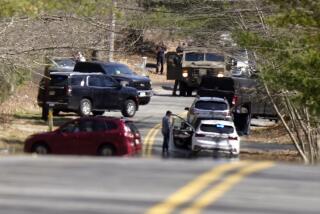North Admits He Took Secret NSC Data
- Share via
WASHINGTON — Lt. Col. Oliver L. North admitted Monday that he and his former secretary removed 168 sensitive documents from the files of the National Security Council when the Iran-Contra scandal surfaced, but he said that his purpose was to “protect myself.”
North, in his third day as a witness at his trial, said also that it had been stupid of him to accept the installation of a $13,800 home security system without paying for it and to concoct two phony letters to cover up the gratuity.
Under cross-examination by prosecutor John W. Keker, the retired Marine officer and former White House aide said that he could have paid for the electronic system himself, noting that for years he has maintained a cash fund of about $15,000 in a closet at home.
Removing documents and accepting an illegal gratuity are among the charges on which North is being tried in connection with his role in providing support to the rebels in Nicaragua. If convicted on all counts, he faces 60 years in prison and $3 million in fines.
North testified that, when his dismissal seemed imminent in late 1986, an attorney friend suggested “that I should have something to protect myself with, to show that I had authority to do what I did.”
North acknowledged that he removed the documents from National Security Council files at the White House, but he said he did not regard his action as illegal.
He said that, after he had left the White House on the day he was fired, his secretary, Fawn Hall, acted on her own to collect many other documents and carry them out hidden in her clothing. Hall, testifying under a grant of immunity from prosecution, has acknowledged that she removed the documents.
“I never instructed her to do it, but I understood she was trying to be helpful,” North said.
North testified that all of the documents that he and Hall removed that day were returned to the White House by his attorney, Brendan V. Sullivan Jr.
Besides the removal of those files, North is accused of destroying or altering other documents.
North helped raise private funds to arm the Nicaraguan Contras and gave them military advice during a two-year period in which Congress had cut off all U.S. military aid to the rebel forces.
North has contended that his covert actions on behalf of the Contras were authorized by his boss, former National Security Adviser Robert C. McFarlane, and by former CIA Director William J. Casey. McFarlane has denied that he knew about the extent of North’s activities and Casey died in early 1987.
In discussing the home security system, North said that he had been upset because he felt that the government should have installed the system for him after he reported that Middle East terrorists had threatened his life.
Evidence at the trial showed that those threats occurred in April, 1986, shortly after North had helped plan a U.S. air raid on the headquarters of Libyan strongman Moammar Kadafi.
North insisted that he never knew who had paid for the electronic system. But trial testimony has shown that the purchaser was retired Air Force Maj. Gen. Richard V. Secord, who was North’s chief assistant in arranging covert arms shipments to the Contras.
After his firing from the National Security Council in November, 1986, North said that he telephoned the installer, former CIA agent Glenn Robinette, and asked for a bill.
Robinette, who testified that he already had been paid by Secord, sent North a back-dated bill. North responded with phony letters saying that he would pay for the system by allowing his home to be used in commercial advertisements for Robinette’s security work.
“I guess I had come to the conclusion that, having the system there, having been fairly well trashed by that point, I was kind of angry, so I sent the phony letters in one of the dumber things I’ve done in my life,” North testified.
North talked about the cash box he kept at his home when Keker pressed him on whether Secord had given him cash from time to time for his personal expenses.
“No. Never,” North said emphatically.
Keker sought to show that North made a partial cash payment on a used GMC Suburban van he was buying in October, 1985. On the same day, a handwritten note showed that he had picked up cash from Secord’s office a mile from the car dealer’s lot in Virginia.
But North said that Secord often provided funds for his travel and other incidental expenses in connection with the Contra resupply effort. He insisted that he had never accepted any cash for personal purposes.
More to Read
Sign up for Essential California
The most important California stories and recommendations in your inbox every morning.
You may occasionally receive promotional content from the Los Angeles Times.













